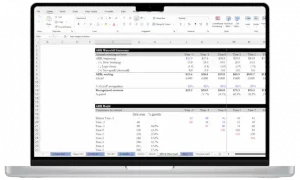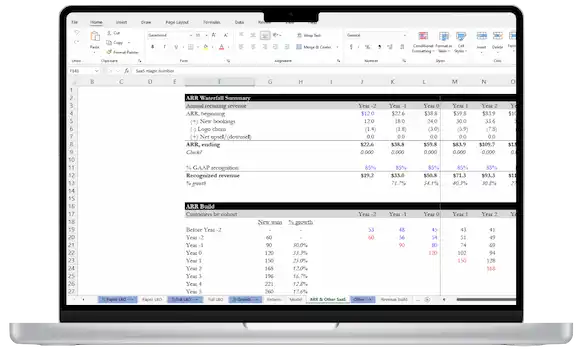The financial sponsors group (FSG) is an important player in the M&A market in the world of investment banking. But what exactly is FSG, and is it an exciting career path?
In this article, we will address frequently asked questions about financial sponsors group investment banking, such as how to break into the group, salary and hours, and potential exit opportunities.
We’ll also go over “financial sponsors group” interview questions and offer advice on how to prepare for it. You’ll have a better understanding of what it takes to succeed in FSG investment banking by the end of this article.
What Is Financial Sponsors Group Investment Banking?
A financial sponsors group is an in-house team that operates within an investment banking division of an investment bank. The role of a financial sponsors group is to advise alternative asset managers at pension funds, hedge funds, sovereign wealth funds, and private equity firms.
A financial sponsors group acts as an industry group for entities that raise capital from investors, use this capital to invest in assets and companies.
This definition makes a financial sponsors group sound like a financial institutions group. But they aren’t. They are both specialized investment banking groups, but they differ in their focuses, and the types of clients they deal with.
Financial sponsors groups mainly work with private equity firms but also deal with other specialized investment firms (e.g. special situation investors, credit managers, hedge funds, family offices, pension funds, and sovereign wealth funds). Interestingly, a financial sponsors group will not cover venture capital firms. This is because their deal sizes are normally quite small. Meanwhile, financial institutions groups typically cover banks, insurance companies, fintech, and other financial firms.
A financial sponsors group helps investors find and acquire companies, but they also often offer advisory services to help portfolio companies execute financing transactions (e.g. debt offerings). They essentially act as coverage groups for private equity firms, as they advise on all deal types.
A financial institutions group normally works with insurance companies, banks, and some other financial institutions. Financial institutions groups provide financing, advisory services, and other services to these entities like helping them to raise capital and manage their assets.
The deals that a financial sponsors group typically works on include:
- Leveraged buyouts
- High-yield debt insurances
- Recapitalizations
- New acquisitions
- Sell-side mergers and acquisitions
Is Financial Sponsors Group A Good Career Path?
To put it simply, working for a financial sponsors group is a great career path.
Talent is always in high demand in the industry, and financial sponsors groups are great places to start if you want to get into the world of investment banking.
The reason for this high demand is that private equity funds and hedge funds often recruit their future junior staff from investment bankers within the financial sponsor group. This is due to the fact that many analysts from this group already know many of the modeling and financial skills required to execute private equity transactions.
Mid-level and senior bankers also highly rate an investment banking career within the financial sponsors group. In this role, you’ll be dealing with interesting and complex transactions. Clients also pay great fees, which means it can be a lucrative group as well.
Duties of an associate at a financial sponsors group
The duties of an associate at a financial sponsors group (FSG) will differ, as different groups operate in different ways. However, an FSG will either be relationship-focused or execution-focused.
Relationship-focused
If an FSG is relationship-focused, then the duties of an associate will include supporting pitching and relationship management for senior bankers. This includes:
- Summarizing the current holdings of a financial sponsor.
- Reporting on “comparables,” which means finding the amounts paid for portfolio companies (or similar companies in an industry).
- Finding potential targets that may be interesting to acquirers to purchase.
Associates in these firms will also need to stay up to date with the latest industry trends in the private equity, hedge fund, and sovereign wealth fund industries.
Execution-focused
At an execution-focused FSG, the duties of junior bankers include helping associates at PE firms with tasks, such as:
- Creating the initial financial analysis or leveraged buyout model.
- Setting up a data room.
- Writing and/or reviewing the Confidential Information Memorandum.
Many FSG teams at bulge-bracket banks focus on execution and operate in this manner.
Is It Hard To Get Into Financial Sponsors Group?
Yes, getting into a financial sponsors group can be quite challenging, especially if you are new to the investment banking world.
To get into an FSG team at an investment bank you will need to have studied at a top university with an undergraduate degree or an MBA.
You will also need to have achieved a high GPA at the university you graduated if you want to stand out from other candidates.
Internship experience at a top investment bank will also help your case. It will show your potential employers that other firms were willing to take you on.
“It’s not what you know, it’s who you know.” is certainly a phrase that applies to FSGs. This is due to the fact that the industry is very tight-knit, so you’ll need to do plenty of networking if you want to land a role at a top investment bank.
To learn more about the art of networking and other helpful tips on how to land a role at a top investment bank, check our comprehensive series on how to get into investment banking.

- 24 lessons
- 6+ video hours
- Expert instructor
ONLINE COURSE
Assess Business Models Like An Investor
Designed for aspiring private equity, growth, or venture investors
Why “Financial Sponsors Group” Interview Question
If you are lucky enough to land an interview with an investment bank, you may have the opportunity to join an FSG team.
If so, you may interview directly with folks from the financial sponsors group team, and they are likely to ask you why you want to join the FSG team.
This is a relatively common question that is asked at most FSG interviews. It helps the interviewer figure out whether you are actually interested in working for an FSG team, and whether you are passionate about the industry.
In your answer to this question, you might mention:
- That you have a passion for investing, and that working with private equity clients interests you, as a result.
- That you enjoy working on technically complex deals with incredibly smart clients.
- That you are interested in working on a range of transactions like leveraged buyouts, recapitalizations, high-yield debt insurances, new acquisitions, and mergers and acquisitions.
People often transition from investment banking into private equity firms, and this might be the reason you want to join an FSG team. However, you should definitely NOT mention this during your interview.
This will make the interviewer think that you only plan to use your position as a stepping stone to get into private equity. Depending on the interviewer, this could either hurt your chances or discount you from getting the position entirely.
Financial Sponsors Group Salary & Hours
Workload
Many people joke that FSG employees don’t work very hard, and only play golf with their clients from private equity firms.
While this might be the case for some managing directors, and other high-level employees, it certainly isn’t true for junior bankers and analysts. Your workload will likely be very similar to other investment banking groups.
There are a few factors that influence what work you will do, and how much work you will do as an FSG analyst or associate. These factors include:
The number of parties involved in deals
Financial sponsor deals can involve multiple parties, including:
- Financial sponsor (your client)
- Investment banking industry group (e.g. Consumer)
- Financial sponsors group (you)
- Investment banking product group (e.g. M&A)
- Portfolio company (e.g. consumer business)
- Potential investors (e.g. who is looking to purchase the business)
If your FSG team regularly does deals involving many parties, then it’s more likely you’ll only focus on one specific aspect of a deal. However, it really depends on the situation.
Industry specialization
If a portfolio company is in a very specialized niche like real estate or oil and gas, then the industry group is more likely to do some of the work that an analyst or associate normally would. The industry group will probably do the modeling in this case, as their employees will likely know more about the accounting and valuation of the portfolio company.
Hours
Some people claim that FSGs offer the best hours in the investment banking industry. This is because FSGs mainly deal with long-term clients, and therefore do somewhat fewer pitches. This isn’t always true, especially if you are an analyst or associate. It mainly applies to senior bankers in FSG.
Salary
Analysts working in FSG earn the same level of salary as other investment banking groups.
Financial Sponsors Group Exit Opportunities
Many people seek out financial sponsors group roles if they eventually want to get into PE firms and hedge funds.
Investment banking roles in FSG give candidates a lot of experience in this regard, as they often work closely with PE firms. So, FSG does provide you with some great exit opportunities if you want to move to a slightly different sector.
Financial sponsors groups are well aware that many of their employees will move into private equity, as this is quite a common occurrence. Some FSGs are okay with this and do what they can to help their employees make the jump to private equity. In some cases, managing directors may even recommend you to private equity firms.
Despite this, it is still important not to mention that you want to move into private equity in an interview.
Private equity isn’t the only exit opportunity available to FSG employees. Many people who work in FSG also move into:
- Growth equity
- Hedge funds
- Venture capital
- Tech companies
- Corporate development and strategy
- Startups
- MBA programs
FAQs
What is the difference between leveraged finance and a financial sponsors group?
FSGs and leveraged finance teams both work with PE firms. However, FSGs focus on maintaining relationships with these firms, while leveraged finance teams focus more on credit and leveraged buyout analysis for deals.
Summary
In summary, the financial sponsors group (FSG) is an important part of investment banking because it provides M&A and other financial advisory services to private equity firms, hedge funds, and other financial sponsors.
While FSG is a competitive field, it provides excellent salary and growth opportunities. You can succeed in FSG investment banking by learning about the industry, preparing for the “financial sponsors group” interview question, and developing the necessary skills and experience.


 Break Into Growth Equity
Break Into Growth Equity

